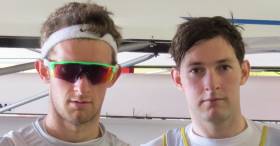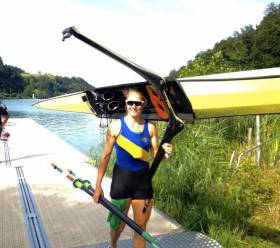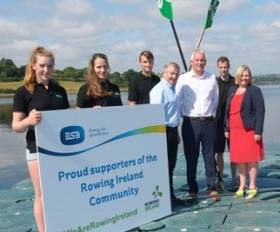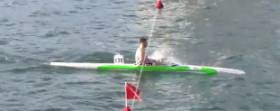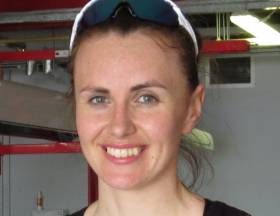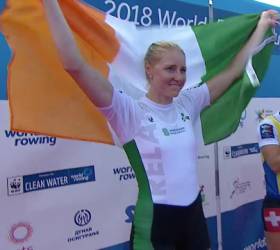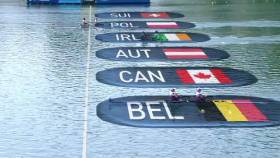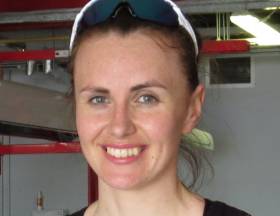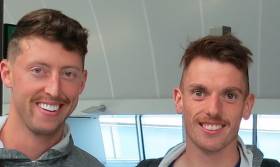Displaying items by tag: Ireland
Good Win for O'Donovans Lifts Them Into A Final at Lucerne
#Rowing: The race was a tight one, but Paul O’Donovan and Gary O’Donovan won their semi-final of the lightweight double sculls to take their place in the A Final tomorrow at the World Cup Regatta in Lucerne.
The Ireland crew took over from early leaders Denmark, who took second, while Canada beat Britain One for the final qualification spot.
World Cup Regatta, Lucerne, Day Two (Irish interest; selected results)
Men
Pair – A/B Semi-Final One (First Three to A Final; rest to B Final): 1 Serbia 6:33.87, 2 Spain 6:36.65, 3 Britain One 6:38.90; 4 Ireland (M O’Donovan, S O’Driscoll) 6:42.02.
D Final (Places 19 to 24): 1 Poland 6:40.95; 5 Ireland (P Boomer, A Harrington) 6:53.83.
Lightweight Double Sculls – A/B Semi-Final One (First Three to A Final; rest to B Final): 1 Ireland (G O’Donovan, P O’Donovan) 6:19.05, 2 Denmark 6:20.03, 3 Canada 6:20.52.
Single Sculls – C Final (Places 13 to 18): 1 Australia 6:58.52, 2 Argentina 6:59.65, 3 Ireland (P Doyle) 7:00.39.
Women
Pair - Repechage (First Two to A Final; rest to B Final): 1 Australia 7:18.62, 2 China One 7:19.86; 4 Ireland (A Keogh, T Hanlon) 7:29.63.
Double – Semi-Final (First Three to A Final; rest to B Final): 1 New Zealand 6:53.91, 2 Canada 6:57.71, 3 Netherlands 6:58.57; 4 Ireland (A Crowley, M Dukarska) 7:06.42.
Puspure Wins Semi-Final at World Cup Regatta in Lucerne
#Rowing: Sanita Puspure won her semi-final of the single sculls at the World Cup Regatta in Lucerne with a dominant performance. Annekatrin Thiele of Germany disputed the lead in the first quarter, but Puspure led by the 1,000 metre mark and was clear by over four seconds at the finish. Austria’s Magdalena Lobnig pushed past Thiele to take second.
World Cup Regatta, Lucerne, Day Two (Irish interest; selected results)
Men
Pair – A/B Semi-Final One (First Three to A Final; rest to B Final): 1 Serbia 6:33.87, 2 Spain 6:36.65, 3 Britain One 6:38.90; 4 Ireland (M O’Donovan, S O’Driscoll) 6:42.02.
D Final (Places 19 to 24): 1 Poland 6:40.95; 5 Ireland (P Boomer, A Harrington) 6:53.83.
Single Sculls – C Final (Places 13 to 18): 1 Australia 6:58.52, 2 Argentina 6:59.65, 3 Ireland (P Doyle) 7:00.39.
Women
Pair - Repechage (First Two to A Final; rest to B Final): 1 Australia 7:18.62, 2 China One 7:19.86; 4 Ireland (A Keogh, T Hanlon) 7:29.63.
Double – Semi-Final (First Three to A Final; rest to B Final): 1 New Zealand 6:53.91, 2 Canada 6:57.71, 3 Netherlands 6:58.57; 4 Ireland (A Crowley, M Dukarska) 7:06.42.
Single Sculls – Semi-Final (First Three to A Final; rest to B Final): 1 Ireland (S Puspure) 7:39.59, 2 Austria (M Lobnig) 7:43.68, 3 Germany (A Thiele) 7:45.59.
ESB Backs Rowing Festival at Inniscarra
#Rowing: ESB has teamed up with Rowing Ireland to support a series of prestigious rowing regattas on Inniscarra Reservoir this month. The Coupe de la Jeunesse, from July 27th to 29th, will attract talented young rowers from 13 countries across Europe. Up to 750 rowers and their support teams are expected in the Cork area for this high-profile event. The event is open to rowers who are 18 years or under. The Festival of Rowing programme also includes the Irish Rowing Championships taking place this weekend, July 13th to 15th, as well as the Home International Regatta which takes place on July 21st.
Rowing Ireland CEO Michelle Carpenter said: “We are delighted with the ESB support of our exciting Festival of Rowing which commences this weekend with the biggest ever Irish Rowing Championships. The relationship between the ESB and Rowing Ireland has been pivotal and we are delighted to have them support our celebration of Irish and International here at our High Performance home in Inniscarra.”
Frank Barry, Plant Manager at ESB’s Lee Stations said: “In what is a milestone month for the rowing community, ESB is delighted to support Rowing Ireland in their hosting of these three upcoming regattas on Inniscarra Reservoir. This support builds on our long-standing relationship with the rowing community. In 2011, ESB entered a 25 year lease with Rowing Ireland which has facilitated development of world-class infrastructure at the National Rowing Centre. As such, the facilities at Farran provide a fitting backdrop as we welcome the international athletes for the 2018 Coupe de la Jeunesse in particular. On behalf of ESB, I wish all participants the very best of luck in these prestigious events.”
Cork County Council and Fáilte Ireland are also providing support for the events.
#Canoeing: Ireland’s Ronan Foley won the European junior championships in the canoe marathon K1 today. He raced remarkably well and was completely in charge at the end of an interesting 22.6 kilometre race in Metkovic in Croatia.
Three paddlers – Foley of Ireland, Thorbjorn Rask of Denmark and Vince Petro of Hungary – broke away on the second of six laps. They stayed together until the final lap, when Foley used the final portage to secure gold. He sprinted away from the other two and when he got back in the water he extended the advantage.
Matt McCartney of Celbridge Paddlers finished 13th.
Canoe Marathon European Championships, Metkovic, Croatia
Men, K1, Junior: 1 Ireland (R Foley) 1 hr 41 min 2.63 sec; 13 McCartney at 7 min 16.5 sec.
#Rowing: Two strong senior composite crews took home the Division One quadruple titles as the action concluded late into the evening on the first day of Cork Regatta at the National Rowing Centre. The women’s final saw Margaret Cremen join Skibbereen’s Lydia Heaphy, Denise Walsh and Aoife Casey to good effect, and the men’s winners were the prospective Ireland Under-23 lightweight quad. Workmen’s and Shandon junior 18 crews were good runners up in the women’s and men’s races.
Cork Boat Club won the Division One men’s coxed four title, while Trinity took the women’s.
Cork Regatta, National Rowing Centre (Selected Results)
Men
Eight – Div Two: Neptune (club two) 6:22.95; 4 Trinity (nov) 6:34.32; 5 Col Iognaid (jun 16) 6:35.63; 6 Shandon (jun 18B) 6:43.79.
Four – Div One, coxed: Cork (inter) 6:34.299; 3 Enniskillen A (jun 18A) 6:39.299. C Final: 2 Neptune (club one) 6:48.37.
Pair – Div One: 1 UCD (S Mulvaney, D O’Malley; sen) 6:53.31, 2 Skibbereen (M O’Donovan, S O’Driscoll; sen) 6:59.98, 3 Enniskillen (jun 18A) 7:06.75; 6 Cork A (inter) 7:23.68. B Final: 6 Neptune A (club one) 7:24.50.
Sculling, Quadruple – Div One: 1 Tara, UCD, Commercial, UCC (sen) 6:00.93, 2 Shandon (jun 18) 6:10.96
Double – Div Two: CRCC (jun 18B) 7:06.99; 5 Cork A (jun 16) 7:15.37. B Final: Cappoquin (club two) 7:20.43
Single Sculls: 1 Skibbereen (P O’Donovan; sen) 6:59.73. B Final: UCC (H Sutton; lwt) 7:20.63. C Final: 1 Shandon (E Gaffney; jun 18A) 7:28.92; 2 Queen’s (N Hull; inter) 7:29.86
Women
Eight- Div Two: Trinity A (club two) 6:52.696; 6 Commercial (jun 16) 7:15.45. B Final: 1 Queen’s (nov) 7:19.09.
Four, coxed – Div One: 1 Trinity (inter) 7:25.63, 2 Commercial (sen) 7:30.06; 5 Shandon (club one) 7:46.78.
Pair – Div One: 1 Skibbereen (A McCarthy, N Casey; sen) 7:49.73; 4 Col Iognaid (Jun 18A) 8:07.86; Shandon (club one) 8:08.78. C Final: 4 Shandon (inter) 8:36.00.
Sculling, Quadruple – Div One: 1 Skibbereen/Lee 6:50.49; 2 Workmen’s (jun 18A) 7:05.596. Div Two: 1 Cork A (club two) 7:50.05; 3 Carlow (jun 16) 8:03.97. B Final: Carlow (jun 18B) 8:13.43; 4 Queen’s (nov) 8:25.47.
Double – Div Two: 1 Killorglin (jun 18B) 7:41.63, 2 New Ross (club two) 7:56.41, 3 Carlow (jun 16) 8:00.41
#Rowing: Ireland’s Aifric Keogh and Emily Hegarty finished third in the women’s pair B Final as the rain came down at the World Cup Regatta in Belgrade. The racing for the day had been brought forward because of the forecast of storms and as this last race progressed the bad weather swept in. Poland had taken the lead early and not yielded it. Keogh and Hegarty also slotted into a spot, third, and despite changes in the order, they finished there, closing up fast on second-placed China Three coming to the line.
Monika Dukarska and Aileen Crowley also took third in the B Final of the women’s double, placing ninth overall. France, Switzerland and Ireland moved away from the field early on and crossed the line in that order.
The Ireland lightweight double of Denise Walsh and Margaret Cremen took sixth in their B Final, 12th overall. The were off the pace in a race won by Canada.
World Cup Regatta, Belgrade, Day Three (Irish interest)
Men
Lightweight Double Sculls – A Final: 1 Poland 6:13.04, 2 Belgium 6:14.09, 3 (G O’Donovan, P O’Donovan) 6:14.10; 4 Canada Two 6:17.27, 5 Austria 6:17.32, 6 Switzerland Two 6:23.87.
Women
Pair – B Final: 1 Poland 7:14.30; 3 Ireland (A Keogh, E Hegarty) 7:16.37.
Double Sculls – B Final: 1 France 6:58.86; 3 Ireland (A Crowley, M Dukarska) 7:03.79.
Lightweight Double Sculls – B Final: 1 Canada 6:55.88; 6 Ireland (M Cremen, D Walsh) 7:07.77.
Single Sculls – A Final: 1 Switzerland (J Gmelin) 7:22.78, 2 Ireland (S Puspure) 7:25.30, 3 Austria (M Lobnig) 7:25.51; 4 Germany 7:27.84, 5 Britain 7:27.93, 6 Denmark 7:31.96.
#Rowing: Sanita Puspure took an excellent silver medal at the World Cup Regatta in Belgrade this morning. Jeanine Gmelin of Switzerland took the gold with a commanding performance, overtaking early leader Magdalena Lobnig of Austria by halfway.
Puspure raced well, taking a clear third place by the closing stages and then beating Lobnig in a battle for the silver.
World Cup Regatta, Belgrade, Day Three (Irish interest)
Men
Lightweight Double Sculls – A Final: 1 Poland 6:13.04, 2 Belgium 6:14.09, 3 (G O’Donovan, P O’Donovan) 6:14.10; 4 Canada Two 6:17.27, 5 Austria 6:17.32, 6 Switzerland Two 6:23.87.
Women
Single Sculls – A Final: 1 Switzerland (J Gmelin) 7:22.78,
2 Ireland (S Puspure) 7:25.30
3 Austria (M Lobnig) 7:25.51; 4 Germany 7:27.84, 5 Britain 7:27.93, 6 Denmark 7:31.96.
#Rowing: Ireland’s Paul O’Donovan and Gary O’Donovan took a bronze medal at the World Cup Regatta in Belgrade this morning. The A Final of the lightweight double was tight and had an exciting finish. Ireland started well, but Poland took the lead and held it through to the 1500 metres mark, with Ireland, Austria and Belgium exerting pressure. The Irish moved in the final 500 metres – but so did Poland. Jerzy Kowalski and Milosz Jankowski drove for the line and won. Belgium caught the Irish and passed them on the line. The took the silver by one hundredth of a second.
World Cup Regatta, Belgrade, Day Three (Irish interest)
Men
Lightweight Double Sculls – A Final: 1 Poland 6:13.04, 2 Belgium 6:14.09, 3 (G O’Donovan, P O’Donovan) 6:14.10; 4 Canada Two 6:17.27, 5 Austria 6:17.32, 6 Switzerland Two 6:23.87.
#Rowing: Emily Hegarty and Aifric Keogh took fourth in their semi-final of the women’s pair at the World Cup Regatta in Belgrade. The two UCC women closed hard in the closing stages on Britain Two, but the British crew of Emily Ford and Emily Ashford held on to the third place which sends them to the A Final. Spain won from Denmark.
The result for the Ireland double of Monika Dukarska and Aileen Crowley was the same. They started well in their semi-final and led to the 500 metre mark. The Netherlands and Belarus One took over and held those places to the end. Belarus Two established themselves in the third qualification spot and Dukarska and Crowley, who finished fast, could not dislodge the second Belarus boat.
The Ireland pair and double will compete in B Finals.
World Cup Regatta, Belgrade, Day Two (Irish interest)
Men
Pair – C Final (Places 13 to 18): 1 Hungary 6:55.35, 2 Greece 6:57.73, 3 Ireland (M O’Donovan, S O’Driscoll) 6:59.0, 4 South Africa 7:00.22.
Women
Pair – Semi-Final Two (Three to A Final; rest to B Final): 1 Spain 7:35.18, 2 Denmark 7:35.77, 3 Britain Two 7:39.35; 4 Ireland (A Keogh, E Hegarty) 7:42.60.
Double Sculls – Semi-Final (Three to A Final; rest to B Final): Netherlands 7:16.27, 2 Belarus One 7:18.73, 3 Belarus Two 7:23.46; 4 Ireland (A Crowley, M Dukarska) 7:25.60.
#Rowing: Mark O’Donovan and Shane O’Driscoll took third place in their C Final of the men’s pair at the World Cup in Belgrade this morning. This was an extraordinary race. Britain Two, South Africa, Ireland and Greece moved as a pack through halfway and the 1500 metres. Greece then took over in the lead, with Ireland also contending. But Hungary, which had hung in sixth and fifth place through most of the 2,000 metres, finished best. They passed the leaders and won, with Greece and Ireland next over the line.
The placing put O’Donovan and O’Driscoll 15th of the 22 crews which raced.
World Cup Regatta, Belgrade, Day Two (Irish interest)
Men
Pair – C Final (Places 13 to 18): 1 Hungary 6:55.35, 2 Greece 6:57.73, 3 Ireland (M O’Donovan, S O’Driscoll) 6:59.0, 4 South Africa 7:00.22.


























